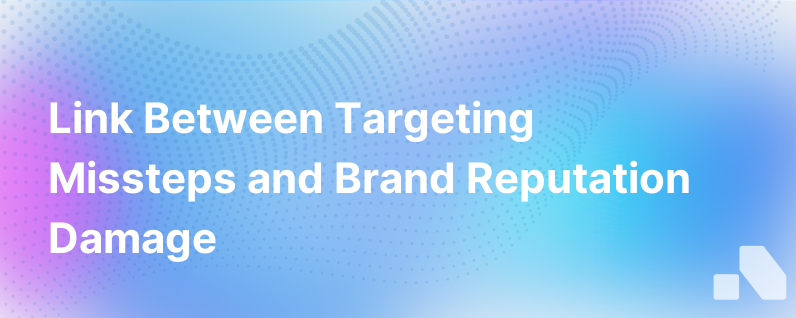
In the interconnected digital world we live in, every action a brand takes is amplified and scrutinized. The marketing and sales tactics companies employ are not just about closing the next deal—they are also about building—or demolishing—a brand’s reputation. With the frenetic pursuit of leads and conversions, one element often gets sidelined: the importance of deliberate targeting. Suboptimal targeting is not just a missed opportunity; it carries the profound risk of eroding brand reputation.
In this discussion, we'll dissect how poor marketing and sales targeting can detrimentally shape public perception of your brand and propose steps to safeguard and enhance your brand's image.
The Interplay Between Targeting and Brand Image
Understanding the Stakes
The business landscape is rife with examples of companies that have suffered the consequences of ill-conceived targeting strategies. Be it a marketing campaign that fails to resonate with its intended audience or a sales pitch which is seen as too aggressive or misdirected, each misstep can lead to negative feedback that is broadcast across a plethora of channels, from social media to industry forums.
The Pitfalls of Broad-Brush Strategies
Many businesses adopt a wide net approach, casting their marketing and sales efforts across a broad audience in the hope of snagging as many leads as possible. However, this lack of precision yields several adverse effects:
- Diluted Messaging: When you try to appeal to everyone, you often end up not appealing particularly well to anyone. Messages that are not tailored to a well-defined audience tend to be generic and fail to create a strong connection.
- Customer Alienation: Potential customers may feel misunderstood or overlooked if they receive communications that clearly aren't for them. These mismatches can lead to frustration and annoyance, making it less likely that those individuals will engage with the brand in the future.
- Resource Drain: Indiscriminate targeting results in inefficiency, consuming resources without offering commensurate returns. This includes monetary costs and, importantly, the time and energy of sales and marketing teams.
The Direct Impact on Reputation
These targeting missteps can manifest in the undermining of a brand's reputation due to several interconnected factors:
- Negative word-of-mouth: Unhappy or alienated customers are more likely to express their discontent socially, tarnishing the brand’s image.
- Social media backlash: In this era, consumers have platforms to immediately criticize and share their negative experiences with a broad audience.
- Perception of insensitivity or incompetence: Campaigns aimed at the wrong audience can come off as insensitive, often suggesting that a brand has not invested effort into understanding its market.
The Case for Strategic Targeting
The Critical Nature of Precision
Effective targeting strategies are predicated on nuanced understanding. By harnessing data analytics and customer insights, brands can craft campaigns and sales initiatives meticulously designed to resonate with their intended demographic.
Segmentation as a Key
A sophisticated approach to targeting involves segmenting the market into distinct groups with similar characteristics, behaviors, or needs and tailoring content and outreach to these segments.
- Developing Buyer Personas: Essential to intelligently segmented targeting is the creation of detailed buyer personas. These semi-fictional representations of your ideal customers help form the basis for focused messaging that addresses specific interests, pain points, and behaviors.
- Personalization: By tailoring communications to these personas, you leverage personalization, which has consistently shown to build brand affinity and foster consumer trust.
The Rewards of Precision
- Improved Customer Experience: With strategic targeting, potential customers receive content and offers that are relevant to them, which enhances their experience and satisfaction.
- Resource Optimization: A more targeted approach also ensures that sales and marketing resources are invested in areas with the highest potential return, which is critical for any business looking to scale efficiently.
- Brand Advocacy: Effective targeting and personalization can not only convert prospects into customers but can turn customers into brand advocates.
Crafting A Responsible Targeting Strategy
Leveraging The Right Tools
Staying ahead requires the integration of advanced technological solutions. Digital tools powered by AI and machine learning, such as the tools offered by Aomni, can analyze vast amounts of data to identify trends, predict behaviors, and recommend precise targeting strategies.
The Human Element
Technology is only part of the equation. It is the human touch—the expertise of marketers and sales professionals—that translates data into strategy and strategy into compelling narratives.
A Balancing Act
While pursuing precision in targeting, it's also important to ensure that tactics remain ethical and respect consumer privacy. Meaningful consent and transparent data practices are fundamental to maintaining a trustworthy brand image.
Conclusion
In conclusion, neglecting the targeting aspect in your marketing and sales strategies can be detrimental to your brand's reputation. Quality over quantity should be the dictum guiding your campaigns. A well-reputed brand is built on the cornerstones of understanding its audience, personalizing its messaging, and being conscientiously strategic about who it targets and how.
The consequences of poor targeting are not just missed revenue opportunities—they can result in irreversible damage to a brand's public image. Aomni offers a sophisticated suite of tools that aid in crafting precise, data-driven targeting strategies, helping protect and enhance your brand's most valuable asset—its reputation.